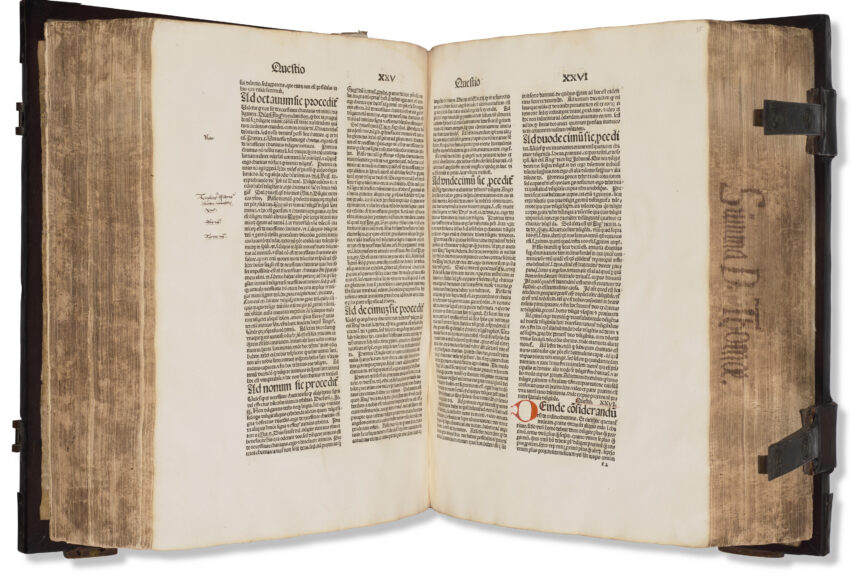Questions 1-26 of the first part of the Summa Theologica are often referred to as Aquinas’s “treatise on God”.
Introduction To A Treatise On God
In the first twenty-six questions of the Summa Theologica, St. Thomas Aquinas constructs a magnificent theological edifice that has shaped Christian thought for nearly eight centuries. Beginning with the nature of sacred doctrine itself, Aquinas demonstrates why divine revelation is necessary for human salvation—not because reason is worthless, but because the human intellect, while capable of discovering certain truths about God, requires divine assistance to grasp the fullness of truth necessary for our ultimate end. This opening establishes the harmony between faith and reason that characterizes the entire work.
From this epistemological foundation, Aquinas proceeds with remarkable systematic precision. After establishing that we can know something about God (Question 1), he proves that God exists through his famous Five Ways (Question 2), and then embarks on an exploration of the divine nature through what theologians call the via negativa—understanding what God is by carefully considering what He is not. This methodical approach reveals God as absolutely simple, perfect, good, infinite, omnipresent, immutable, eternal, and one. Through Questions 12-26, Aquinas then examines how this transcendent God can be known by finite creatures and how He operates through knowledge, will, and providence.
A Treatise On God: Questions 1-26 Of The First Part Of The Summa Theologica
- Q.1: The Sacred Doctrine
- Q.2: The Existence of God
- Q.3: The Simplicity of God
- Q.4: The Perfection of God
- Q.5: Goodness in General
- Q.6: The Goodness of God
- Q.7: The Infinity of God
- Q.8: The Existence of God in Things
- Q.9: The Immutability of God
- Q.10: The Eternity of God
- Q.11: The Unity of God
- Q.12: How God is Known by Us
- Q.13: The Names of God
- Q.14: Of God’s Knowledge
- Q.15: Of Ideas
- Q.16: Of Truth
- Q.17: Concerning Falsity
- Q.18: The Life of God
- Q.19: The Will of God
- Q.20: God’s Love
- Q.21: The Justice and Mercy of God
- Q.22: The Providence of God
- Q.23: Of Predestination
- Q.24: The Book of Life
- Q.25: The Power of God
- Q.26: Of The Divine Beatitude
Final Thoughts
What emerges from these twenty-six questions is not merely an abstract philosophical system, but a coherent vision of reality centered on the God who is Being Itself. Aquinas’s genius lies not just in his individual arguments, but in how he weaves together biblical revelation, Aristotelian philosophy, Platonic insights, and Christian tradition into a unified whole. The principle of participation—that creatures have being, goodness, and truth by sharing in God who IS these realities essentially—provides the metaphysical framework that connects Creator to creation while maintaining the absolute distinction between them.
The systematic progression from epistemology to existence to essence to operations reveals the careful architecture of Aquinas’s thought. Each question builds upon previous conclusions, creating an ascending spiral of understanding. The unity of the divine attributes in God’s absolute simplicity means that what our limited minds must analyze separately—God’s goodness, truth, beauty, justice, mercy—exists in Him as one simple, perfect reality. This insight has profound implications for theology, spirituality, and ethics.
Perhaps most remarkably, Aquinas manages to hold together seemingly paradoxical truths: God is utterly transcendent yet intimately present, absolutely simple yet containing all perfections, immutable yet dynamically engaged with creation, eternal yet responsive to temporal prayers. His sophisticated treatment of different modes of duration—time, eternity, and aeviternity—demonstrates how medieval theology grappled with questions that continue to challenge philosophers today.
The via negativa and via eminentiae provide complementary approaches to the mystery of God. By understanding what God is not (composite, finite, mutable) and affirming that He possesses all perfections in the highest degree, Aquinas charts a middle course between anthropomorphism and agnosticism. This apophatic dimension of his theology shows surprising connections with Eastern Christian thought, while his emphasis on analogical predication provides a way to speak meaningfully about God without reducing Him to human categories.
These foundational questions of the Summa remain astoundingly relevant. In an age of renewed debate about God’s existence, the nature of consciousness, the relationship between science and religion, and the meaning of existence itself, Aquinas offers resources that transcend the medieval context. His integration of faith and reason, his metaphysical realism, and his profound understanding of participation and analogy provide tools for engaging contemporary questions while remaining rooted in the Christian tradition. The God revealed in these pages—infinite yet personal, transcendent yet immanent, simple yet containing all perfections—continues to inspire both philosophical reflection and spiritual devotion.
Thanks for reading!
